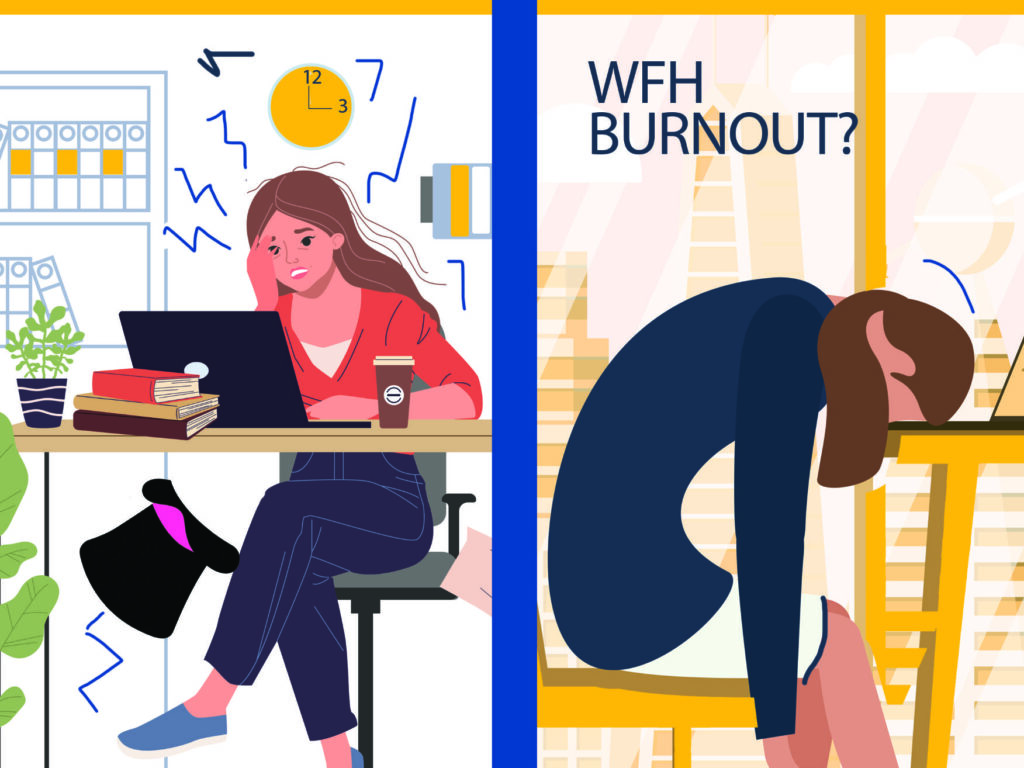
The term “burnout” was coined in the 1970s by the American psychologist Herbert Freudenberger and was used to describe the consequences of severe stress and high ideals in “helping” professions (i.e. doctors and nurses). Since then, the progression of all things digital has created several jobs that allow employees to work from home and consequently have changed the way we view burnout in the workplace.
The term “burnout” refers to the physical or mental collapse caused by overwork or stress and can affect anyone, especially those who work from home. Although job burnout in itself is not a medical diagnosis, it can cause serious mental and physical health risks aside from work-related stress. Because of the increase in research and overall consideration of mental health, it’s much easier to spot the signs and take steps to prevent burnout in the usual office setting or if you work from home.
Are you on your way to feeling burnout?
Several things can contribute to burnout while you work from home, many of which are out of an individual’s control. Some of the things that may cause burnout include:
- Lack of control. An inability to influence decisions that affect your job — such as your schedule, assignments, or workload — could lead to job burnout. So could a lack of the resources you need to do your work from home.
- Unclear expectations.If you’re unclear about the degree of authority or what others expect from you, you’re not likely to feel comfortable at work.
- Dysfunctional workplace. Perhaps you work with an office bully, or you feel undermined by colleagues or your boss micromanages your work. These can all contribute to job stress.
- Excessive repetition.When a job is monotonous or chaotic, you need constant energy to remain focused.
- Lack of validation.If you feel isolated while you work from home or in your personal life, you might be craving the “good job” or “thumbs up” from those around you. That can lead you to second guess yourself on even the smallest decisions.
- Work-life imbalance.If your work takes up so much of your time and effort that you don’t have the energy to spend time with your family and friends, you might burn out quickly. During COVID-19 lockdowns, this has been a problem for many people as they work from home. The line between work and your personal life may feel blurred, and making time for relaxation can be challenging.
- Feeling drained, emotionally exhausted, unable to cope, tired, down with your work from home, or lacking the energy to do everyday tasks? This could be due to work-related burnout. You may also feel physical exhaustion symptoms such as pain and stomach or bowel problems.
- Alienation from (work-related) activities:People who have burnout when they work from home find their jobs increasingly stressful and frustrating. This can cause cynical thoughts about their working conditions and their colleagues. At the same time, they may increasingly distance themselves emotionally, and start feeling numb about their work.
- Reduced performance: Burnout mainly affects everyday tasks at work, at home, or when caring for family members. People with burnout are very negative about their tasks, find it hard to concentrate or be creative.
- Educate yourself. Know the symptoms and the causes. If you are reading this blog you are already off to a good start. It’s important to fully understand the implications of burnout to determine if you need to seek further advice from a licensed professional.
- Reach out. Coping with burnout requires some support from others. This can be challenging when you work from home, but if you’ve been struggling lately, it’s time to let your friends and family know how you feel. Spend some time doing things you enjoy with people close to you to take your mind off of work.
- Find balance. You’re more likely to experience burnout when you feel like all you do is work from home. Carve out some time during the workday to stretch, take a lunch break, or maybe go for a walk. When you’re done with work, try to spend some time every day on something that feels fulfilling to you. Is there a creative project you could start, or an important charity you could contribute to?
- Nurture workplace relationships. Having a friend or two at work can make the day less stressful. Even if you work from home, you can socialize through video meetings, texts, or email. A little friendly small talk can help you feel less isolated and boost your mood.
- Take good care of yourself. Taking care of your physical health is one of the most important things you can do for your mental health while you work from home. Make sure you’re getting enough sleep, eating nutritious food, and finding time to exercise.




